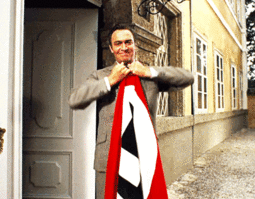http://www.thenation.com/article/193977 ... e-prisons#
What does the fox say???
How white liberals used civil rights to create more prisons
- Cassius Clay
- Ultimate Poster
- Posts: 2420
- Joined: Sun Jan 04, 2015 8:03 pm
- Cassius Clay
- Ultimate Poster
- Posts: 2420
- Joined: Sun Jan 04, 2015 8:03 pm
Re: How white liberals used civil rights to create more prisons
The brilliant insight of Murakawa's book is to locate today's enforcement of white supremacy in the tool devised by liberals for “solving" the problem of violent, extralegal racism:
Liberal law-and-order translated international battles against colonialism and genocidal racial violence into an agenda of procedural fairness, race-neutral machinery, and formal equality. Race liberals…set out to corrrect the lawlessness, not the lethality, of racial violence. In this sense, the fight for racially just law-and-order was already lost.
In other words, black people were guaranteed safety only from violence falling outside of a fair set of legal rules. A report from Truman's Presidential Committee on Civil Rights holds that “[a society] cannot permit human beings to be imprisoned or killed in the absence of due process of law without degrading its entire fabric." (Emphasis mine.) Society can imprison and kill, as long as the law was followed fairly. For race-liberals this is not a contradiction: if racism is a case-by-case fairness problem, if white supremacy is an arbitrary unfairness, then a perfect and fair set of legal rules is mutually exclusive with racism. Therefore, perfectly administered rules ipso facto stop racial discrimination.
Murakawa carefully traces how this legalistic perception of civil rights, codified under Truman, evolves into LBJ's Great Society. LBJ, faced with massive black uprisings, treated the riots not as political expression but rather as pure criminality. Drawing a hard line between protest and riots, treating the former as political speech but the latter as inchoate violence, is one way that liberals discredit resistance to impoverishment and brutality. LBJ could thus, without a lick of irony, compare Klansmen and black rioters of Watts as “what the law declares them: law breakers." He “likened police and prisons to teachers and schools: all need federal funding to build a better society." It's hard to imagine a framework that equates black people rioting with KKK lynchings as a framework capable of achieving racial justice. Instead, civil-rights legislation looked to achieve order, and the end of black “crime."

- Cassius Clay
- Ultimate Poster
- Posts: 2420
- Joined: Sun Jan 04, 2015 8:03 pm
Re: How white liberals used civil rights to create more prisons
I would say here that they have the exact same interest(liberals and conservatives): counter-revolution. They want to stop the riots, and return to law and order. By ignoring intentions, Murakawa's account can observe precisely how certain bipartisan outcomes are achieved, but the method also sometimes misses the way liberals and conservatives collude due to a shared class interest in stability.
Prison rates may have skyrocketed faster in the United States than anywhere else, but prison populations worldwide have grown tremendously during the same period. Prisons are one way to address the ongoing global crisis of falling rates of profit that began in the early seventies. Massive prison populations lower unemployment in the short term and discipline the work force by transforming working-class people into felons who can be relegated to low-wage jobs. High incarceration rates also move first-world manufacturing from union shops into prison yards where pay can be 25 cents an hour without having to fear the social consequences. In one sense, The First Civil Right lets liberal politicians off the hook by not going after the interest groups and industries that they actually represent. A study more inclined to follow the money might reveal them to have gained equally from the production of the PIC, and to have been serving their real class constituency just as ably as the conservatives in doing so.
All of this is not to argue that big money is more important than racism. Every single dollar bill is soaked with the blood of slaves: there is no economy without white supremacy, and vice versa. Murakawa's important work resolves a nagging question: how, exactly, the American historicizing of the black freedom movement and the production of civil rights has structured our conceptions of race, justice and crime. It's one of the most maddening contradictions of American history: there is no New Jim Crow without Brown v. Board of Education.
